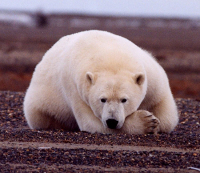The Evolution of Biodiversity Under a Changing Climate
 Climate change poses one of the principal threats to the biological diversity of the planet, according to the most comprehensive survey of the ecological state of the planet, the Millennium Ecosystem Assessment, completed in 2006. Altering a species' distribution, the timing of reproduction, and the growing season for plants — the rate of climate change is happening so fast that many species cannot adapt quickly enough and risk extinction.
Climate change poses one of the principal threats to the biological diversity of the planet, according to the most comprehensive survey of the ecological state of the planet, the Millennium Ecosystem Assessment, completed in 2006. Altering a species' distribution, the timing of reproduction, and the growing season for plants — the rate of climate change is happening so fast that many species cannot adapt quickly enough and risk extinction.
At the National Institute for Mathematical and Biological Synthesis, Dr. Xavier Thibert-Plante wants to know how climate change affects biodiversity. As a postdoctoral fellow, Thibert-Plante examines the interaction between ecological and evolutionary forces and their impact in shaping the planet's biodiversity.
"Understanding the processes underlying biodiversity can help direct our actions to minimize our impact on living organisms," Thibert-Plante says. "Ultimately, we may save species from extinction and maintain the fragile equilibrium."
Some of the processes underlying biodiversity that Thibert-Plante studies are adaptation and gene flow, which can work in oppositional ways. When the temperature rises, some species might expand their range, but this range expansion might be inhibited by the movement of genes from one population to another, also known as gene flow. In his research, Thibert-Plante investigates to what extent gene flow constrains range expansion by homogenizing the gene pool and preventing local adaptation. On the other hand, in what cases does adaptation reduce gene flow and allow range expansion and colonization of new habitats?
"Those two opposing mechanisms are occurring at the same time, but he conditions that determine which force will drive the system are unknown under a changing environment," Thibert-Plante says.
Part of Thibert-Plante's research involves studying how changes in a species' population affect its environment and how changes in the environment affect a population and how it evolves, something called "eco-evolutionary feedback." An example of this are Darwin's finches on the Galápagos Islands who likely influenced seed distribution on the islands, which in turn influenced the evolution of the finches themselves.
Originally from Montréal, Québec, Thibert-Plante says he became interested in evolution via computer science. "My supervisor pointed me to genetic algorithms, and I was amazed by the strength of the evolutionary mechanisms, specifically mutation and selection. From that point, I wanted to know more about evolution in living organisms," he explains.
Thibert-Plante comes to NIMBioS after completing his Ph.D. in biology from McGill University in Canada. He also has a master's degree in geography and a bachelor's degree in physics and computer science.
#
A video about Thibert-Plant's research can be viewed here. For more information about postdoctoral fellowships and other research and educational opportunities at NIMBioS, visit our website at http://www.nimbios.org.
NIMBioS
1122 Volunteer Blvd., Suite 106
University of Tennessee
Knoxville,
TN 37996-3410
PH: (865) 974-9334
FAX: (865) 974-9461
Contact NIMBioS


